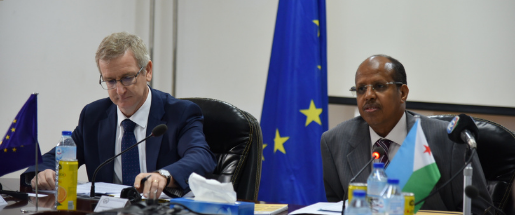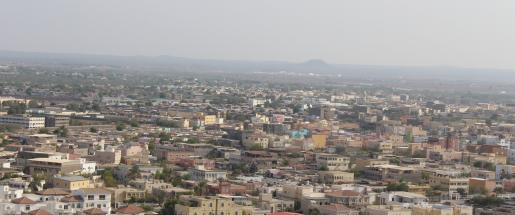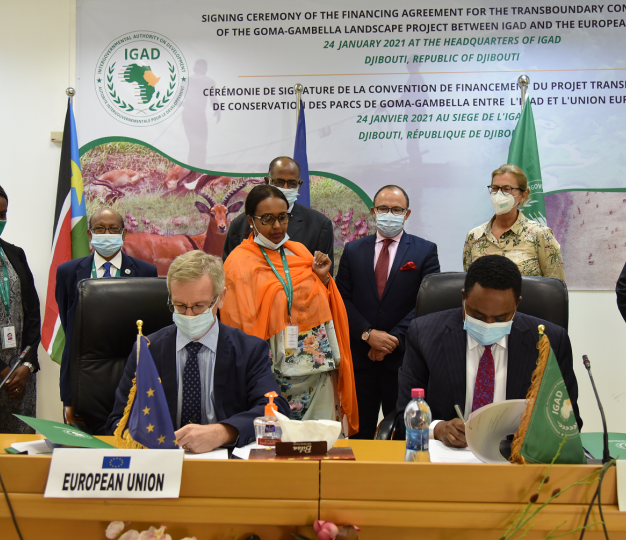RELATIONS WITH THE EU
The European Union and Djibouti
One of the smallest states in Africa, with an estimated population of 820,000, the Republic of Djibouti enjoys a high growth rate but faces a challenge in terms of sustainable and shared development. The European Union is the main donor there, intervening exclusively in the form of grants, with priorities in the areas of water, sanitation, resilience and food security. The promotion of peace and security in the region is also at the heart of European engagement since the Atalante anti-piracy operation has its logistics base in Djibouti.

Political Relations
The European Union and the Republic of Djibouti are working together to stabilize the Horn of Africa, notably within the framework of AMISOM, Operation Atalanta, and, until recently, the Eucap Nestor mission. The EU and Djibouti jointly encourage IGAD to become stronger and more effective in areas such as peace and security and regional integration.
Within the framework of the political dialogue meetings provided for in Article 8 of the Cotonou Agreement, but also through various approaches and contacts, the EU and its Member States promote in Djibouti the values of democracy and the rule of law. And respect for public freedom.

Economic Relations
Djibouti is also participating in negotiations between the EU and the countries of eastern and southern Africa with a view to creating an economic partnership. Djibouti is not a signatory to the EU's Economic Partnership Agreements (EPAs), but discussions must be held with eligible states to encourage them to sign these agreements.
The Djibouti government has announced that it wants to undertake a reform of public establishments to improve their efficiency in terms of economic and financial management. It is a question, in particular, of modernizing the rules of governance of companies and public establishments (EEP), by reinforcing the autonomy of their management in a perspective aiming at the same time the transparency, the efficiency and the responsibility of the bodies of management.
As part of the PEPER project, "Production of Drinking Water by Desalination and Renewable Energy", the financing agreement provides for a support component for sectoral reforms in water and electricity. These reforms aim at the technical and financial viability of the two EEPs (National Office for Water and Sanitation of Djibouti - ONEAD and Electricité De Djibouti - EDD). In this context, organizational, technical and financial audits should be carried out.

Trade Relations
Djibouti is a member of the World Trade Organization (WTO), and grants at least MFN treatment - most-favored-nation clause: equal treatment for others - to all of its trading partners. The country has made commitments on trade in goods and services. Djibouti is not a signatory to any of the WTO's plurilateral agreements.
Since December 2013, at the Bali Ministerial Conference, WTO members, including Djibouti, have concluded negotiations for the Trade Facilitation Agreement (AFE). This agreement will enter into force as soon as two-thirds of WTO members have ratified it. AFE aims to speed up the movement of goods, including goods in transit. In particular, it provides for measures for more effective cooperation between customs and other competent authorities.
Other agreements and arrangements:
Djibouti is a member of IGAD, COMESA and the African Union and participates in African integration initiatives at the continental level. Although Djibouti has ratified the agreement on the system of trade preferences among member states of the Organization for Islamic Cooperation, it has made no major commitments to dismantle its tariff or non-tariff barriers. Djibouti is negotiating a free trade area under the Arab League.
Intergovernmental Authority for Development
Cooperation with the Intergovernmental Authority for Development (IGAD) is based on regional strategy papers and Regional Indicative Programs (RIPs) for East Africa, Southern Africa and the Indian Ocean. Currently, this cooperation is implemented mainly through the 10th European Development Fund (EDF).
Development cooperation:
The general objective pursued with IGAD within the framework of the PIR of the 10th EDF is to contribute to the eradication of poverty in the countries of the region, to support them in achieving the Millennium Development Goals through assistance in the economic and commercial sectors. The specific objectives are the support of regional integration, in particular, the strengthening of regional cooperation and its support within the wider framework of the world economy.
The sectors of concentration of the 10th EDF RIP are regional economic integration but also a regional political integration/cooperation agenda through a series of measures aimed at helping the region to face political issues in a coordinated manner.
Under the 10th EDF, IGAD benefits from support in the area of management and/or conservation of renewable natural resources of a transboundary nature (water, protected areas) but also in the area of transboundary surveillance of animal diseases and strengthening the resilience capacities to climate shocks of herders and pastoralists in the region.
As part of the 9th EDF, IGAD benefited from programs to strengthen social protection and disaster risk management policies providing, among other things, for the operationalization of a Regional Operational Budget for Disasters and a Multi-Risk Atlas. In addition, with the support of the European Union and the technical support of the World Food and Agriculture Organization, IGAD was able to strengthen the initiative for livestock policies, a vital sector for the Horn of Africa.

